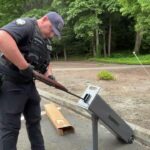
This weekend, in the shadow of the Second Amendment Foundation’s own backyard, the city of Bellevue, Washington will be hosting a gun “buyback” event. It’s yet another chapter in the long-running political theater of compensated confiscation, where well-meaning citizens are encouraged to turn in their firearms—often for far less than they’re worth—in exchange for a gift card and the illusion of safety.
At a glance, this may sound like a straightforward public service. But scratch the surface, and you’ll find bureaucratic contradiction, questionable efficacy, and the unmistakable scent of political grandstanding.
Bellevue’s event is funded by a grant from the Washington State Attorney General’s Office, though officials haven’t disclosed where that money originates. Taxpayers? Asset forfeitures? Federal handouts? We’re left guessing.
Participants must be residents of King County, but the event also touts “anonymity” as a feature. How does one prove residency without providing identification? The city suggests covering your name when showing a document—say, a utility bill—but this opens the door to obvious loopholes. Bring your cousin’s electric bill, and as long as you’ve got the zip code, you’re in.
Even more baffling: participants can’t handle their firearms on site. According to Bellevue PD, doing so could get you removed—or even arrested. But this begs the question: How does one hand over a firearm for a gift card… without handling it? No clear guidance has been offered. Should firearms be in the trunk? In a case? Should someone yell “ready!” from the car window? Details are scarce, and that’s being charitable.
Meanwhile, private buyers—who could offer significantly more than the city’s gift card rates—are effectively chased off the premises, even though Washington’s background check laws would require any sale to be routed through a licensed dealer (FFL) anyway.
Assuming Bellevue follows King County’s past pricing, participants can expect:
- Up to $100 for a standard handgun, rifle, or shotgun
- Up to $200 for anything labeled an “assault weapon”
“Up to” being the operative term—many participants will receive far less, especially for older or non-functioning firearms.
Here’s the problem: even a basic, working-condition firearm is worth significantly more on the private market. A pawn shop, FFL, or local gun store would likely offer more cash, no questions asked—and no charade required.
For those turning in rusty, inoperable, or obsolete weapons, sure, $100 might sound like a great deal. But that doesn’t make this a meaningful safety program. It makes it a glorified junk collection funded by government grants.
Let’s call these events what they are: optics-first policy. There’s no data to suggest gun buybacks reduce crime. There is, however, ample evidence to suggest that criminals don’t turn in their weapons—and that law-abiding citizens who do participate often give up non-crime-linked, older, and less valuable firearms.
And while Texas moves to ban municipal buybacks outright, red states may soon follow. In liberal jurisdictions, though, this ritual of symbolic disarmament shows no sign of slowing down.
It’s not about results. It’s about narrative control. It’s about politicians being able to say they “did something,” even if that “something” is funneling public money toward collecting dusty shotguns from basements while simultaneously erecting procedural hurdles that make the process confusing and exclusionary.








